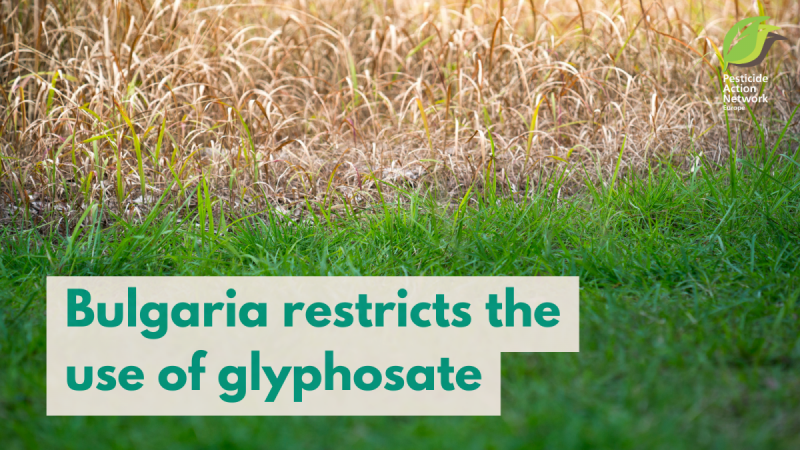The use of glyphosate will partially be banned in Bulgaria. It will no longer be available in areas used by the general public, public parks, gardens, sports and recreation grounds, school and children's playgrounds, as well as near health and educational facilities.
Glyphosate-containing herbicides will be allowed only for professional use in Bulgaria. Only users certified by the Bulgarian Food Safety Agency will be able to buy and use this chemical. The Bulgarian Food Safety Agency says all producers and traders are obliged to change their use:
- Not to be used by non-professional users, all glyphosate-containing products should be categorised in the professional use category
- Not approved for aerial spraying
- Not allowed as a desiccant or defoliant before the harvest of agricultural crops
- Not allowed for the treatment of water channels
- Not to be applied on areas used by the general public or by vulnerable groups, such as public parks and gardens, sports and recreation grounds, school and children's playgrounds, as well as in the immediate vicinity of health and educational facilities
- Not to be applied in protection zones defined in the Water Act or other areas defined by order of the Minister of Environment and Water
"The action of the Bulgarian Ministry is a good step to reduce the use of the dangerous weed killer. Which is catastrophically damaging to human health, biodiversity, soil and water," said Dr. Svetla Nikolova, from AGROLINK Bulgaria.
“The partial ban on glyphosate in Bulgaria is a significant milestone in protecting our health and environment. This decision underscores the vital role of civil society in advocating for safer practices and promoting sustainable agriculture. By restricting the use of this harmful herbicide in public spaces and vulnerable areas, Bulgaria is taking a proactive stance in safeguarding biodiversity, soil health, and water quality. We acknowledge AGROLINK's significant contribution to this important regulatory change, which represents a meaningful step towards a healthier and more sustainable future for Bulgaria”, said Ina Agafonova, from Via Pontica Foundation, member of PAN Europe from Bulgaria.
The new regulation is published on the government website with the register of authorised plant protection products. The Bulgarian Food Safety Agency has yet to introduce how it will control the implementation of prohibitions and restrictions. So far glyphosate-containing herbicides can be bought freely from agro-pharmacies and shops. Manufacturers label them without the necessary instructions for use and warnings about its dangerous consequences
The Great Glyphosate Court Case
In December 2023 the European Commission gave the green light for 10 more years of glyphosate in the European Union. This is a disaster for health, biodiversity, soil and water. Many independent scientific studies show the dangers. To re-approve glyphosate is a violation of the EU Pesticide Law that says that health and the environment should go first. In case of substantial doubt, the precautionary principle has to be applied.
Together with ClientEarth (EU), Générations Futures (France), GLOBAL 2000 (Austria), PAN Germany, and PAN Netherlands, we have launched a legal challenge against the European Commission’s recent decision to re-approve glyphosate. After conducting a detailed examination of the glyphosate re-approval process and identifying several critical shortcomings we submitted a Request for Internal review to the Commission, marking the first step in this legal battle.
Bulgaria shows Member States can individually take steps against glyphosate while we fight the European Commission’s decision in court.
